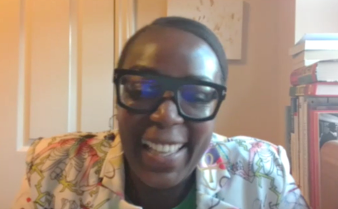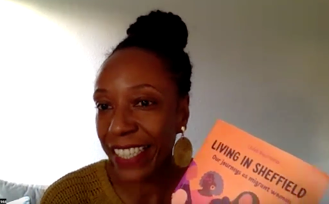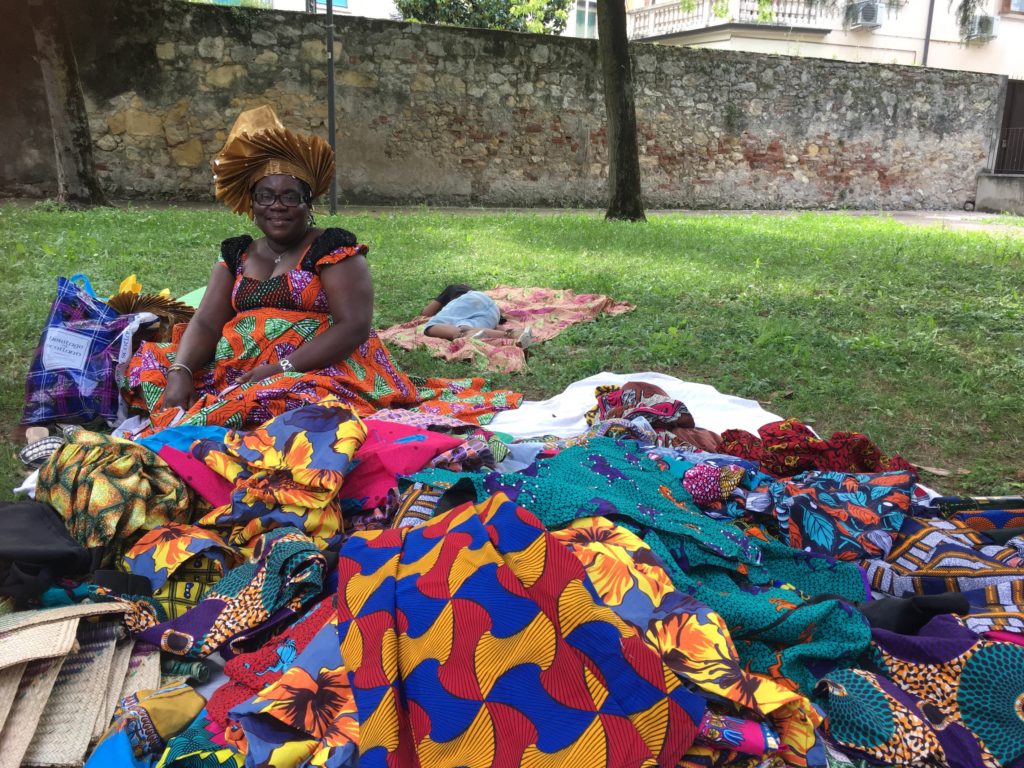Here at Migrant Women Press, we have been working hard over the past year to bring you new ways of amplifying the voices of migrant women. As part of our newly launched Literature Section, we really wanted to host an online event with a migrant woman author to discuss writing, publishing, and sharing our stories. On 18 September, we finally did it! Our Journey as Migrant Women in Conversation with Livia Barreira was a great success.
✍🏾 Laura Rodríguez-Davis
If you missed our first online event featuring Brazilian journalist and author Livia Barreira, do not fear! You can find all the highlights from our conversation here.
Joined by a community of women, Livia, author of Living in Sheffield, and Angelina Abel, founder of Mulembas d’Africa, sat down for an hour-long conversation with our founder Juliana da Penha and yours truly via Zoom.

On the Self-Publishing Process
Livia emphasised that she had the idea for her book three years before she finally wrote it. When the pandemic left her unemployed, Livia decided it was time to write the book. Not only did she write her own story, but Livia recruited eight migrant women, including Angelina, to share their stories of making a life in Sheffield, England. As a first-time publisher, Livia had to research and learn how to self-publish a book. “I never published a book before, even in Portuguese…it was a totally new thing outside my comfort zone,” she reflected.
Throughout the hour, Livia and Angelina included lots of practical advice. Livia described the many things she had to learn, such as buying an ISBN code for her book, sending a copy of the book to the British Library, and contacting publishing companies. From her experience, she advises using a publisher outside of London for affordability, creating a website for sales, and connecting with local bookstores, especially if your book relates to your city.
Livia also discussed the design and production of the book. “You need to think about what you actually want,” she instructed, “You need to think about an identity…that represents what you want to put out for people.” For those fundraising to cover the costs of publication, Livia also advised using the resources of websites like Crowdfunder for guidance and support, keeping the community at the centre by doing launch events within your own community, and calculating the entire cost of publication before starting a fundraiser.
Continuing she also strongly recommended getting a proofreader to read over your work before publishing. Wanting to create a high-quality tome that the migrant community could be proud of, Livia was adamant about the value of a proofreader in the publishing process. “This is an important thing to avoid mistakes, and also it can compromise the quality of the book,” she shared. To this end, prior to printing hundreds of books, Livia emphasised the importance of just having one copy of the book printed first as an opportunity to check for errors and make changes if needed.
The Living in Sheffield author spoke honestly about why she self-published her book: she had no other choice. “This is the only option I had to take my career back as a journalist in the UK,” she confessed. As many migrant women understand, having a professional career in your native country does not secure you a career in the UK. The book, however, allowed Livia to showcase her many skills in journalism, networking, marketing, and administration, which Angelina affirmed as evidence disproving the “stigma” of self-publishing not being as prestigious as traditional publishing.
On Writing and Publishing in English
With a background in Translation, Angelina is no stranger to the challenges of learning and speaking in a new language. Playfully sharing her own struggles with the Yorkshire accent, she encouraged attendees to stay focused on their purpose when facing frustrations with learning English. “There’s a need to really reconnect with the reasons why you’re here, why you’ve travelled to another country, what you’re trying to achieve,” the dancer stated.

For many of Livia’s readers who speak English as a second language, Living in Sheffield was the first book in English they were able to finish. “It was another thing I had in mind,” she explained, “to have this as an accessible kind of English because I want the message to really go to migrant people.” When Livia donated some of her books to refugees and asylum seekers, her commitment to accessibility ensured they also could enjoy the book for themselves.
Livia informed guests that a simple Google search for “Free English Classes” can help newcomers find support in learning English. She attested to the difference these classes and clubs made in developing her own English language skills as an early migrant.

On Imposter Syndrome, Pursuing Your Dreams, and Believing In Yourself
To cope with imposter syndrome, Angelina challenged guests to evaluate the environment and systems around them instead of internalising the responsibility of feeling confident. “What we don’t do often is actually to examine the external factors around us, and that leads us to have that lack of confidence,” she observed.
Throughout the call, Angelina and Livia repeatedly affirmed the importance of community and friendships. As Angelina stated, “…it comes back to the community. Who are you surrounded by? Who’s your tribe? Who’s that person that supports you so well?…That’s the person you can go to and have an honest conversation.” Livia agreed, “I think things do really improve when we find our own communities.” In addition to encouraging Black women to find their people, Angelina urged, “Do not code switch. Do not become something different to fit in. Find a way to reconnect to those roots.”
When it comes to making progress, Livia cautioned how social media makes harmful comparisons with others very easy. “Don’t compare yourself to anyone else. I think it’s more honest…to compare ourselves with us.”
Angelina also provided some practical advice for achieving your dreams. “Don’t lose perspective of who you are. Identify your transferable skills as well so you can identify where you can work,” she said. Clarifying your short-term goals that will help you become established, such as getting a bank account or a national insurance number, is part of the process. Many migrant women have the additional challenge of supporting family and loved ones back home. For Angelina, this was the drive that propelled her forward in her job as she earned her dance qualification.
Finding resources in the community is also important for developing your dreams as a migrant woman. With some research, you can find volunteer opportunities, evening courses, and English classes that help you achieve your goals, according to Livia and Angelina.
With a final message to migrant women, Livia closed, “Believe in your fresh ideas. This country really needs us.”
You can purchase a copy of Living in Sheffield by Livia Barreira here.
Laura Rodríguez-Davis is a writer based in Belfast, Northern Ireland. She is the Migrant Women Press Literature Editor.



